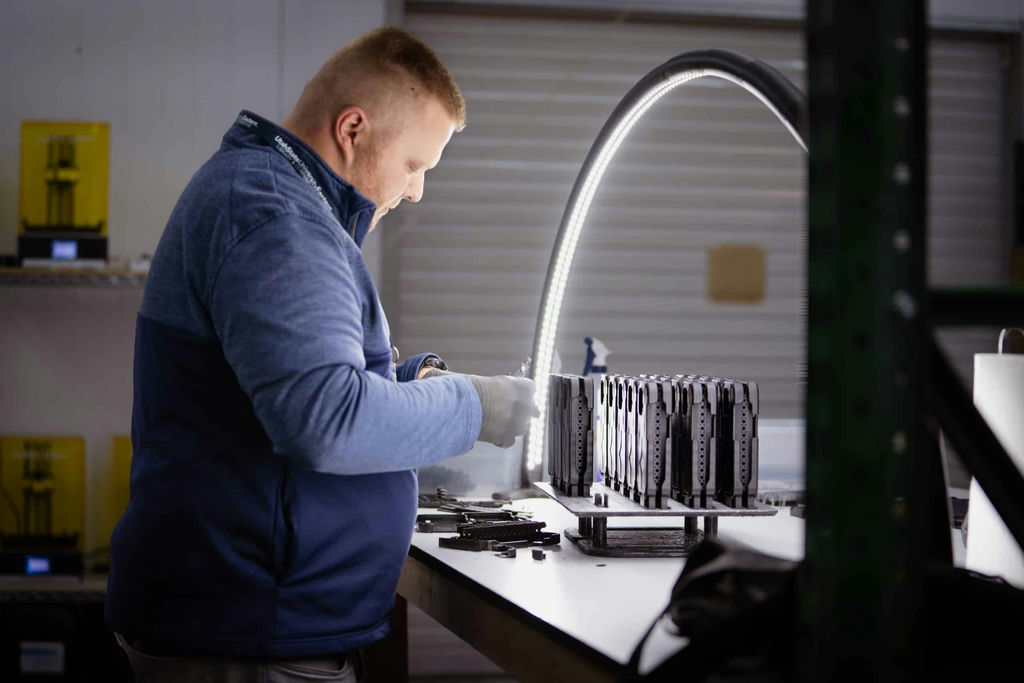Carbon and Emery counties’ economies have largely been supported by coal mining. Coal fueled the Denver and Rio Grande Western Railroad that ran through the valley, but changes in the 140 years since the counties’ founding mean coal mining can no longer fuel the area’s economic engine. The area has become the second-largest natural gas producer in Utah with 94 billion cubic feet produced in 2008, yet people in the area need more economic opportunities.
Enter Merit3D, a subset of Dustless Technologies. Founded by Spencer Loveless and Blake Merrell, the company uses additive manufacturing—a.k.a. 3D printing—to create products for a wide variety of uses and retailers. Merit3D is focused on bringing manufacturing jobs back to the U.S. while also growing the economic opportunities in eastern Utah.
“We know there’s a war on coal, and in Carbon and Emery County, power plants and coal are the dominant industries,” said Merrell. “What’s the future for rural Utah? We believe that Merit 3D, using additive manufacturing technology, is part of that future.”
Merrell describes the venture into additive manufacturing as the “bleeding edge” of the industry with no precedent. New technology in 3D printing is rapidly emerging and, in many ways, it has become a race to see who can use it successfully.
As a part of the CARES Learn and Work funding, Merit3D and USU Eastern began offering non-credit courses in additive manufacturing to expose students to the possibilities of manufacturing and the job opportunities that are opening locally.
“Additive manufacturing lets us bypass our suppliers overseas and bypass injection molding,” explained Loveless.
Austin Kipp, the professional practice instructor over the additive manufacturing program at Utah State University Eastern, emphasizes the hands-on nature of the program.
“We try to tie the experience to real world scenarios,” said Kipp. “Students work with 3D printers and create their own products from the beginning of the program. Any student can come in and be successful and have fun with it.”
Loveless shared how 3D printing can be used to manufacture things as simple as phone cases to outdoor and medical equipment like carabineers and limb casts. The company is also exploring ways to strengthen 3D printed materials by electroplating.
Thanks to funding from the Strategic Workforce Investment, the program will become a permanent technical education program starting summer of 2022 with a one-semester certificate offered in Price at the USU Eastern Campus. The certificate is comprised of 12 credits spread across courses that cover product design, computer design, and pre- and post-production processes. Students also gain experience working with businesses and gaining industry skills.
“This new manufacturing program utilizes industry partner lab space to facilitate practice and real work experience in a manufacturing setting,” said Zak Konakis, pathway coordinator at USU Eastern. “We accept new students into the technical education program every semester and we attempt to meet the needs of the industry and our students’ schedules.”
The certificate is also part of USU’s stackable program, meaning students can apply the credits they earn in the certificate to an associate of applied science in general technology and even further into a technology systems bachelor’s degree.
Subscribe to AM Chronicle Newsletter to stay connected: https://bit.ly/3fBZ1mP
Follow us on LinkedIn: https://bit.ly/3IjhrFq
Visit for more interesting content on additive manufacturing: https://amchronicle.com/


